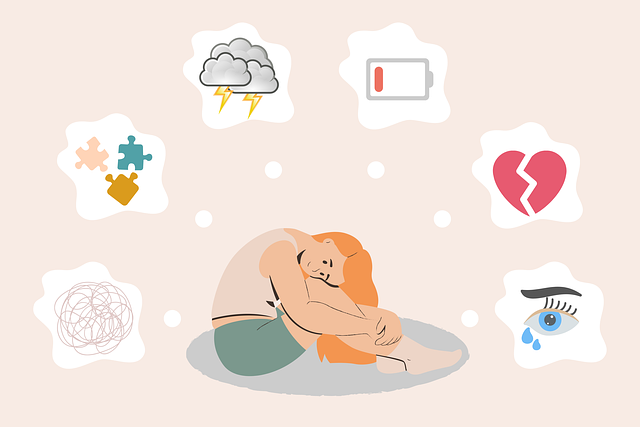Stress management workshops provide a comprehensive approach to treating Boulder Panic Disorder (BPD) and anxiety attacks, focusing on emotional intelligence and holistic therapy. These sessions create a supportive environment through interactive activities, group discussions, and relaxation techniques like breathwork and meditation. Combining Cognitive Behavioral Therapy (CBT), mindfulness practices, and self-care routines, these workshops equip individuals with tools to manage stress, reduce BPD symptoms, and enhance overall well-being. By fostering emotional resilience and building long-term coping skills, the workshops empower participants to lead more balanced lives, offering an effective solution for BPD and anxiety attacks therapy.
Stress management workshops have emerged as powerful tools for empowering individuals to combat anxiety and stress-related disorders, such as Boulder Panic Disorder. This comprehensive guide delves into effective strategies for organizing workshops that facilitate therapy for anxiety attacks. From understanding the impact of stress to incorporating interactive techniques like mindfulness and Cognitive Behavioral Therapy (CBT), we explore practical methods for creating a supportive environment and building long-term resilience.
- Understanding Stress and Its Impact: Unveiling the Prevalence of Boulder Panic Disorder
- Creating a Supportive Environment: Designing Workshops for Effective Therapy
- Interactive Techniques for Anxiety Management: From Mindfulness to Cognitive Behavioral Therapy
- Incorporating Relaxation Strategies: Breathwork, Meditation, and Progressive Muscle Relaxation
- Building Resilience and Long-term Coping Skills: Empowering Participants with Practical Tools
Understanding Stress and Its Impact: Unveiling the Prevalence of Boulder Panic Disorder

Stress, a ubiquitous part of modern life, can have profound effects on both mental and physical health. Beyond acute stress responses, chronic stress is linked to various conditions, including Boulder Panic Disorder (BPD), characterized by recurrent and intense anxiety attacks. BPD symptoms can significantly impair daily functioning, making it crucial to understand and address this growing concern.
Workshops focused on Stress Management often become powerful tools in combating BPD and enhancing overall well-being. By integrating Emotional Intelligence techniques, these sessions empower individuals with the skills to recognize and manage stress triggers effectively. Moreover, Confidence Boosting activities within such workshops can help individuals challenge negative thought patterns associated with anxiety, fostering a sense of resilience and control over their emotional states.
Creating a Supportive Environment: Designing Workshops for Effective Therapy

Creating a supportive environment is paramount for effective therapy in stress management workshops. The setting should encourage participants to feel safe, respected, and understood. This fosters openness and willingness to engage in discussions about their Boulder Panic Disorder and Anxiety Attacks. Incorporating elements of comfort, such as soft lighting, soothing music, and a welcoming atmosphere, can help individuals relax and be more receptive to learning new strategies for coping with stress.
Workshop designs should prioritize interactive activities that promote empathy building strategies and self-care practices. Engaging exercises, group discussions, and role-playing scenarios enable participants to share their experiences, gain insights into others’ struggles, and develop a sense of community. By combining therapeutic techniques with practical tools for managing stress, these workshops can offer transformative experiences tailored to address both the symptoms and underlying causes of anxiety, including Panic Disorder.
Interactive Techniques for Anxiety Management: From Mindfulness to Cognitive Behavioral Therapy

Stress management workshops play a pivotal role in empowering individuals to tackle anxiety head-on. Interactive techniques have gained prominence, offering practical tools for those dealing with panic disorder and anxiety attacks. Mindfulness practices, such as meditation and deep breathing exercises, provide participants with moments of calm amidst chaotic thoughts, fostering emotional resilience.
Cognitive Behavioral Therapy (CBT) is another effective approach integrated into these workshops. CBT helps individuals identify and challenge negative thought patterns contributing to anxiety. By learning to reframe cognitive distortions, participants gain valuable insights into managing their responses to stressful situations. This evidence-based therapy has proven successful in various mental health policy analyses and advocacy efforts, highlighting its potential for widespread emotional well-being promotion techniques.
Incorporating Relaxation Strategies: Breathwork, Meditation, and Progressive Muscle Relaxation

Incorporating relaxation strategies is a cornerstone of effective stress management workshops. Techniques like breathwork, meditation, and progressive muscle relaxation (PMR) have been proven to reduce symptoms of anxiety disorders, including Boulder panic disorder and anxiety attacks. Breathwork focuses on controlled inhalation and exhalation to induce a state of calm, while mindfulness meditation encourages participants to stay present, cultivating awareness without judgment. PMR involves systematically tensing and relaxing different muscle groups, helping to release physical tension and promote mental relaxation.
These practices are particularly valuable in today’s fast-paced world, where public awareness campaigns highlight the importance of mental health. By integrating these strategies into workshops, participants gain confidence boosting tools to navigate stressful situations. Regular practice can enhance overall well-being and foster a sense of resilience, enabling individuals to better manage their anxiety symptoms and lead more balanced lives.
Building Resilience and Long-term Coping Skills: Empowering Participants with Practical Tools

In stress management workshops, a significant focus is placed on building resilience and long-term coping skills to help participants navigate life’s challenges with greater ease. Through interactive sessions, attendees learn practical tools to manage anxiety and panic disorders, empowering them to take control of their mental health. Techniques such as mindfulness exercises, breathing strategies, and cognitive reframing are introduced to help individuals reduce stress levels and develop a stronger sense of emotional well-being.
One effective method taught is self-care routine development for better mental health. Participants are guided through journaling exercises that foster mental wellness by encouraging them to reflect on their thoughts and emotions. By integrating mind over matter principles, the workshops equip attendees with the knowledge and skills needed to prevent anxiety attacks and promote overall mental wellness.
Stress management workshops play a pivotal role in empowering individuals to combat anxiety, especially conditions like Boulder Panic Disorder. By combining therapeutic techniques such as mindfulness, cognitive behavioral therapy, and relaxation strategies, these workshops equip participants with effective tools to manage stress and prevent anxiety attacks. Through interactive sessions, learners develop resilience and long-term coping skills, fostering a supportive environment for emotional well-being. This holistic approach not only addresses the symptoms but also enhances overall mental fortitude.














